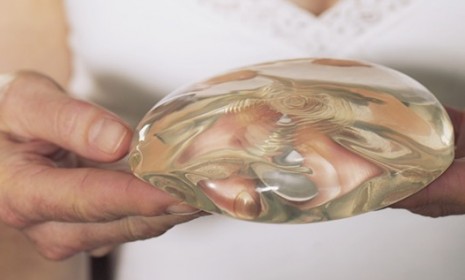Are silicone breast implants really safe?
Five years after the FDA allowed silicone breast implants back on the market, it continues to insist they're safe — though that may just be "wishful thinking"

A free daily email with the biggest news stories of the day – and the best features from TheWeek.com
You are now subscribed
Your newsletter sign-up was successful
In 1992, the Food and Drug Administration banned silicone breast implants, amid a chorus of concerns that they could cancer, lupus, or other diseases. Five years ago, regulators allowed the implants back on the market, saying research had ruled out most disease fears. Now, after reviewing obligatory studies from two silicone implant manufacturers, the FDA says that it made the right decision, and "that silicone gel-filled breast implants have reasonable assurance of safety and effectiveness when used as labeled." But are they really so safe? Here, a brief guide:
What exactly did this review find?
Silicone implants are reasonably safe, at least in the short term. The FDA said there was no "apparent association" between the implants and breast cancer, fertility issues, and "connective tissue diseases" like lupus and rheumatoid arthritis.
The Week
Escape your echo chamber. Get the facts behind the news, plus analysis from multiple perspectives.

Sign up for The Week's Free Newsletters
From our morning news briefing to a weekly Good News Newsletter, get the best of The Week delivered directly to your inbox.
From our morning news briefing to a weekly Good News Newsletter, get the best of The Week delivered directly to your inbox.
So implants are totally safe?
Not quite. "Breast implants are not lifetime devices," the FDA said. "The longer a woman has silicone gel-filled breast implants, the more likely she is to experience complications," and more long-term research is needed. It's still extremely important that women with implants have regular check-ups and screenings for ruptures, and inform their doctors if they experience any unusual pain or swelling.
Where did this new data come from?
In large part, though not entirely, the FDA drew its conclusions from studies conducted by two silicone implant manufacturers: Allergan Inc. and Johnson & Johnson's Mentor Worldwide, a fact that has provoked criticism. "It's frustrating that the FDA can't present solid, independent research on precisely what the risks are," says Margaret Hartmann at Jezebel.
A free daily email with the biggest news stories of the day – and the best features from TheWeek.com
Are the studies flawed?
Some say they are. Each of the ongoing studies, which were a condition of the FDA's decision to re-approve implants in 2006, initially involved approximately 40,000 women. The women are supposed to be followed for 10 years, but researchers have already lost contact with a significant number of subjects. According to the FDA, Allergan has managed to follow up with 60.5 percent of its subjects for two years, while Mentor has followed only 21 percent of its women over three years. "The studies don’t provide most of the safety information that they were required to provide," says Diana Zuckerman with the National Research Center for Women and Families. The FDA's safety claims are "a lot of wishful thinking." The agency acknowledges issues with the data, and says it will work with outside experts to improve the studies.
How many women get breast implants?
Last year, nearly 400,000 women in the United States received breast implants, and more than 60 percent of them chose silicone implants over saline.
Sources: Jezebel, Los Angeles Times, Wall Street Journal, Washington Post